Top 10 AI Cryptocurrencies to Check Out

Cryptocurrencies have become increasingly popular over the past few years, with more and more people investing in digital currencies like Bitcoin and Ethereum. But what about Artificial Intelligence (AI) cryptocurrencies? As AI technology continues to evolve and mature, they are changing the way that companies invest money, develop new products, and enhance customer experiences – especially when it comes to cryptocurrency investments. This article will dive into the probabilities and explore which AI cryptos will lead the market in 2023!
What are AI Cryptocurrencies?
Digital assets known as AI cryptocurrencies blend Artificial Intelligence with their foundational technology. These cryptocurrencies employ AI algorithms to automate tasks, streamline operations and processes, and offer predictive analytics for traders. Consequently, AI cryptos have gained popularity among investors seeking profits from cryptocurrency markets due to their advanced capabilities.
Artificial intelligence enabled cryptocurrencies can help traders make better-informed trading decisions, leading to potentially smarter and more profitable trades. Additionally, AI cryptos are commonly acknowledged to have a higher potential for returns when compared to regular cryptocurrencies. Cryptocurrency projects that use AI usually integrate artificial intelligence technology into their blockchain networks.
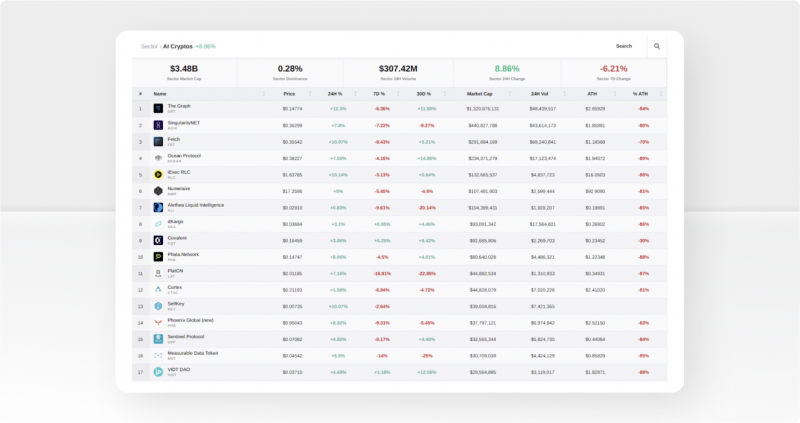
Developers now have a groundbreaking platform to build applications and services that have the potential to make the system more transparent and efficient. AI can be utilized in different ways, such as in consensus algorithms, executing smart contracts, or analyzing data. Developers can integrate AI with blockchain technology to perform various tasks, such as identifying investment opportunities and automating processes.
AI cryptocurrencies offer advantages to investors and developers, enabling more efficient, transparent operations, potentially leading to increased profits for traders and more secure applications for developers. With AI’s assistance, these cryptos can potentially transform the cryptocurrency industry. Thus, if you’re interested in capitalizing on this emerging technology, consider investing in AI cryptocurrencies.
Most Promising AI Crypto Projects
As AI technology advances and becomes more widely adopted, the potential for cryptocurrency projects incorporating AI increases. In this list, we look at some of the top AI cryptocurrencies that are expected to be influential in 2023. These cryptos have the potential to revolutionize the industry.
The List
- Graph (GRT)
- SingularityNET (AGIX)
- Fetch (FET)
- OCEAN
- iExec RLC (RLC)
- Numeraire (NMR)
- Injective (INJ)
- dKargo (DKA)
- Alethea AI (ALI)
- Сortex (CTXC)
Read on for an overview of these AI crypto projects, the artificial intelligence features, usage cases, and their AI crypto tokens.
1. The Graph (GRT)
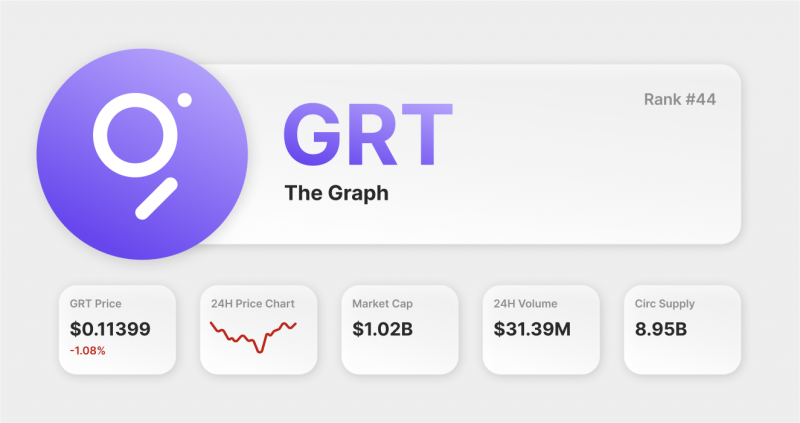
The Graph, an open-source and decentralized protocol, focuses on indexing and querying data from blockchains, particularly the Ethereum network. This AI crypto project was established in 2020, striving to simplify and expedite the process of obtaining crucial information from diverse, decentralized networks for developers. By facilitating more efficient and accessible interaction with decentralized data, the GRAPH project is crucial for the growth and evolution of the Web3 ecosystem and decentralized applications (dApps).
The Graph project’s primary feature is its ability to remove dependence on centralized data servers by offering a trustless and permissionless infrastructure. This allows developers to create powerful and scalable dApps without sacrificing security or transparency. Furthermore, the protocol is compatible with numerous smart contract platforms, with plans to extend compatibility to other blockchains in the future. This cross-chain interoperability heightens the GRAPH protocol’s utility and potential within the broader crypto ecosystem.
Use Case
Designed with a variety of use cases in mind, the Graph project caters to decentralized finance (DeFi) platforms, non-fungible token (NFT) marketplaces, and decentralized gaming platforms. These applications require quick, dependable, and secure data access, which the GRAPH protocol supplies efficiently. As the decentralized web expands, the need for a robust data indexing solution like the Graph project will only grow, solidifying its role as a vital component of blockchain infrastructure.
The Native Token
At the heart of the Graph project lies GRT, its native token. GRT is multifunctional within the ecosystem, incentivizing various network participants such as Indexers, Curators, and Delegators. Indexers manage and store data in an organized fashion, while Curators identify and prioritize valuable data sets for indexing. Delegators contribute by staking their GRT tokens in support of Indexers and Curators. These participants are rewarded with GRT tokens for their contributions, ensuring the network remains efficient and secure.
2. SingularityNET (AGIX)
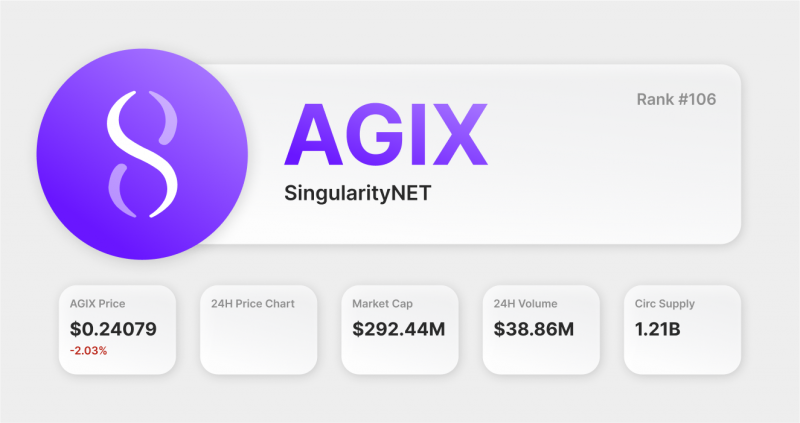
SingularityNET (AGIX) represents a distributed, open-source protocol that aspires to establish a worldwide network dedicated to artificial intelligence services. Initiated in 2017, the project’s main objective is to democratize AI technology accessibility, empowering AI developers, businesses, and individuals to use and collaborate on AI solutions effortlessly. SingularityNET employs blockchain technology to offer a safe, transparent, and efficient platform for AI service providers and users to engage and transact without intermediaries.
SingularityNET comes with several distinct features that differentiate it from conventional AI platforms:
- Its decentralized nature guarantees that AI service providers maintain control over their intellectual property, while users can access AI services without being confined to a single provider.
- The platform supports interoperability among various AI services, allowing developers to effortlessly combine multiple AI solutions to develop new and innovative applications.
- The transparent and trustless nature of the blockchain platform ensures that all transactions on the platform are secure and resistant to tampering.
Use Case
The use cases for SingularityNET span various industries and sectors, such as healthcare, finance, transportation, and entertainment. For example, medical researchers can leverage AI services on the platform to analyze complex data sets and identify patterns, leading to the discovery of new treatments and diagnostic tools. Financial institutions can utilize AI-driven risk analysis and fraud detection services to improve the security and efficiency of their operations. Moreover, the entertainment industry can access AI-generated content, such as music, art, and virtual reality experiences, providing new creative possibilities for artists and content creators.
The Native Token
AGIX (previously known as AGI) is SingularityNET’s native token, serving various functions within the ecosystem. AGIX operates as the platform’s primary payment method for AI services, enabling users to access a broad array of AI solutions, from natural language processing to computer vision. Moreover, AGIX incentivizes AI developers and AI service providers to contribute to the platform, as they receive AGIX tokens in return for their services. The token is also vital for platform governance, allowing token holders to participate in decision-making and influence the project’s future trajectory.
3. Fetch (FET)
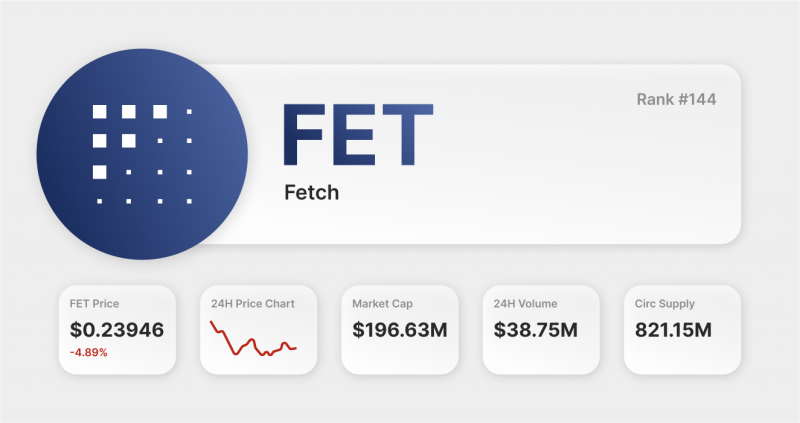
Fetch (FET) represents a distributed, open-source initiative that fuses blockchain technology with artificial intelligence and machine learning to build an adaptable and effective digital economy. Launched in 2017, Fetch aspires to transform various sectors by automating processes, optimizing resources, and offering new economic prospects. The project envisions a network of autonomous economic agents (AEAs) capable of interacting, transacting, and collaborating with minimal human intervention, culminating in a more intelligent and efficient digital ecosystem.
Have a Question About Your Brokerage Setup?
Our team is here to guide you — whether you're starting out or expanding.
A distinguishing characteristic of the Fetch project is its inventive strategy for creating a decentralized digital economy. The platform facilitates the development of AEAs, AI-driven software agents representing individuals, businesses, or even IoT devices. These agents autonomously carry out tasks, make decisions, and engage in transactions on behalf of their owners. Employing machine learning algorithms, AEAs learn, adapt, and enhance their performance over time, fostering a more effective and intelligent ecosystem.
Use Case
Fetch’s potential use cases span various industries and sectors, including transportation, healthcare, supply chain management, and energy. For example, AEAs could optimize transportation routes to reduce traffic and congestion and improve efficiency for logistics firms. In healthcare, AEAs could assist with patient monitoring, appointment scheduling, and medication management, improving patient care and streamlining administrative tasks. Additionally, the platform can be employed to optimize supply chain operations, ensuring timely deliveries and lowering operational expenses.
The Native Token
FET, the project’s native token of the Fetch project, serves various functions within the ecosystem. FET functions as a payment method for services and transactions on the platform and is also used for staking and governance. By staking FET tokens, network participants contribute to the platform’s security and stability and participate in decision-making processes. Moreover, the FET token encourages developers, businesses, and individuals to create and deploy AEAs on the network, as they can receive FET tokens for their contributions.
4. Ocean Protocol (OCEAN)
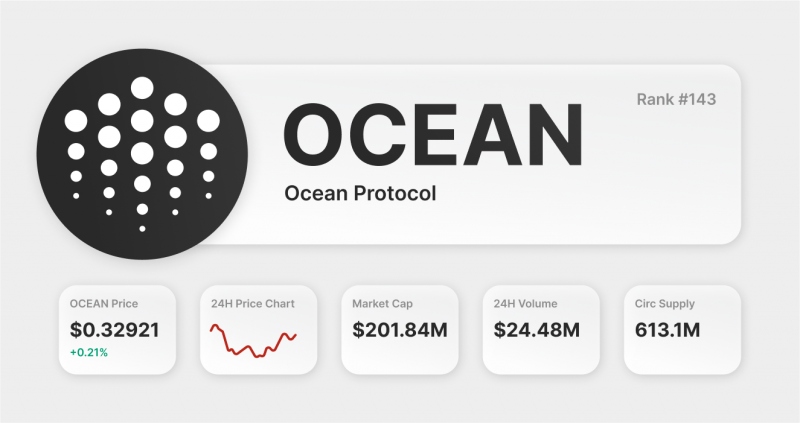
Ocean Protocol (OCEAN) represents a distributed, open-source initiative aiming to unleash the complete potential of data by establishing a secure and transparent decentralized data exchange platform. Ocean Protocol empowers individuals, businesses, and organizations to monetize, share, and access valuable data while preserving privacy and also encourages the contribution and curation of high-quality datasets. Started in 2017, the project addresses the growing demand for data sharing and collaboration in the era of big data and artificial intelligence.
A central feature of Ocean Protocol is its emphasis on data privacy and security. The platform employs advanced cryptographic methods, such as zero-knowledge proofs and secure multi-party computation, ensuring data remains encrypted and confidential during transactions. This enables data providers to share and monetize their data without jeopardizing privacy or revealing sensitive information. Ocean Protocol’s blockchain-based infrastructure also guarantees transparency, traceability, and trust in all data transactions and interactions.
Use Case
Ocean Protocol use cases’ potential extends across numerous industries and sectors, including healthcare, finance, transportation, and scientific research. In healthcare, Ocean Protocol can enable secure and privacy-preserving data sharing between medical institutions, fostering the creation of new treatments, diagnostics, and personalized medicine. Financial institutions can utilize the platform to access valuable datasets for risk analysis, fraud detection, and customer insights while adhering to data protection regulations. The platform can also support data-driven decision-making in areas like transportation, urban planning, and environmental monitoring, ultimately promoting enhanced efficiency and sustainability.
The Native Token
OCEAN, the native token of the Ocean Protocol project, serves various functions within the ecosystem. OCEAN acts as the primary payment method for data and services on the platform, granting users access to a diverse range of datasets and AI services. The token also incentivizes data providers and curators to contribute valuable datasets and uphold the quality of the platform’s data marketplace. Moreover, network participants can stake OCEAN tokens, enhancing the platform’s security and enabling users to partake in governance decisions.
5. iExec RLC (RLC)
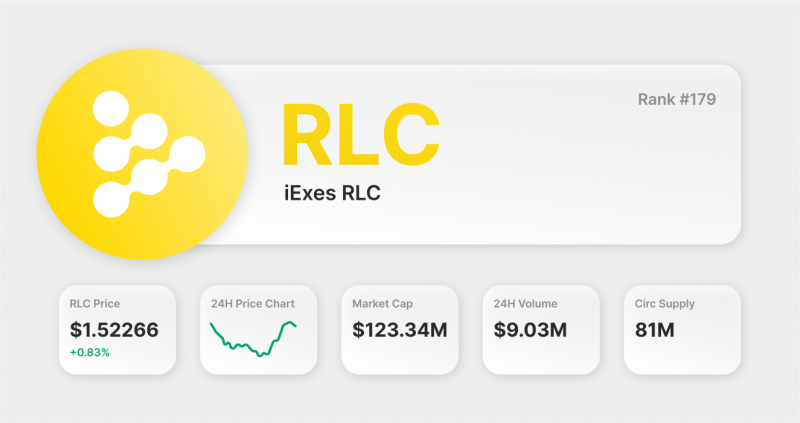
iExec RLC (RLC) represents a pioneering, decentralized initiative that centers on building a distributed cloud computing platform powered by blockchain technology. Launched in April 2017, this AI crypto project strives to offer an accessible and secure marketplace for users to lease or share computing resources, including processing capabilities and storage. By employing a decentralized infrastructure, iExec RLC democratizes access to cloud computing services, promoting increased innovation and efficiency in the industry.
iExec RLC distinguishes itself through its inventive approach to decentralized cloud computing. The platform uses a unique consensus algorithm called Proof-of-Contribution (PoCo), which verifies and maintains the quality of the computing resources provided. Additionally, iExec RLC employs secure enclaves and other sophisticated cryptographic techniques to preserve data privacy and security throughout the computing process. This guarantees that users can access and share computing resources without jeopardizing sensitive data or proprietary algorithms.
Use Case
The iExec RLC project presents a wide array of use cases that can benefit various industries and sectors. For example, small enterprises and start-ups can leverage the platform to access cost-effective cloud computing services, allowing them to scale and expand more efficiently. Researchers and data scientists can take advantage of the platform’s distributed computing power for intricate simulations and data analysis, expediting advancements in areas like climate modeling, genomics, and drug discovery. In the gaming realm, iExec RLC can support the creation of decentralized gaming platforms that deliver enhanced performance and reduced latency for players.
The Native Token
RLC, the native digital coin for the iExec RLC project, fulfills various crucial functions within the ecosystem. RLC serves as the primary means of payment for transactions on the platform, with users requiring RLC tokens to access computing resources and services. Furthermore, RLC tokens incentivize resource providers, such as individuals and data centers, who earn tokens by contributing their computing power to the network. The utility token is also involved in network governance, allowing holders to vote on platform enhancements and upgrades.
6. Numeraire (NMR)
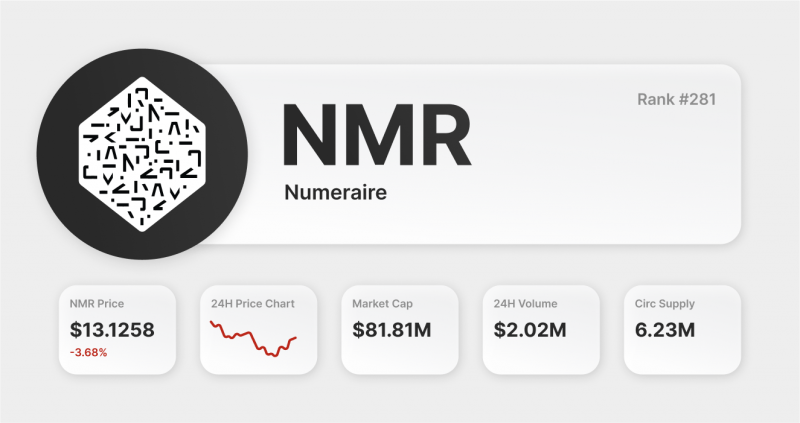
Numeraire (NMR) represents a distinctive and inventive crypto initiative that utilizes decentralized intelligence to develop more precise and efficient financial models. Established in 2017 by hedge fund Numerai, the project aims to create a community-driven, cooperative platform where global data scientists can devise and enhance predictive financial models employing artificial intelligence and machine learning techniques.
Use Case
The main use case for the Numeraire project is in the financial sector, particularly in creating investment strategies and risk management models. By harnessing the collective intelligence of its community, Numeraire can produce more accurate predictions of market trends and asset price fluctuations, empowering investors and financial institutions to make better-informed decisions. Furthermore, the project has the potential to stimulate innovation in other finance areas, such as credit scoring, fraud detection, and portfolio optimization.
The Native Token
The native digital asset of the Numeraire project, NMR, is vital for incentivizing and rewarding participants within the ecosystem. Data scientists who contribute their expertise and models to the platform can stake their NMR tokens to demonstrate their confidence in their predictions. If their models prove successful, they earn extra NMR tokens as rewards. In contrast, poorly performing models can lead to the loss of staked tokens. This distinctive staking mechanism fosters competition and cooperation among participants, ultimately resulting in more precise and efficient financial models.
7. Injective (INJ)
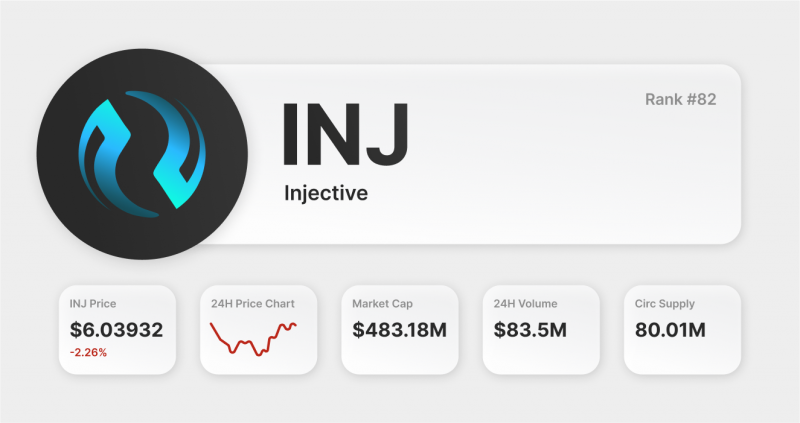
Injective (INJ) is an advanced, decentralized crypto initiative that aspires to establish a swift, secure, and completely decentralized trading platform for diverse financial products, such as cryptocurrencies, derivatives, and futures. Initiated in 2018, the Injective Protocol crypto project aims to overcome the drawbacks of current decentralized exchanges (DEXs), including high latency, low liquidity, and restricted trading choices, by utilizing sophisticated technology and an exclusive consensus mechanism to deliver a more streamlined and user-friendly trading experience.
A distinguishing feature of the Injective project is its inventive layer-2 scaling solution, which substantially improves the platform’s transaction speed and capacity. By adopting this solution, Injective can offer a high-performance trading experience with near-immediate transaction confirmations and minimal fees, addressing the prevalent issues of existing DEXs. Additionally, the platform supports an extensive array of financial products and presents advanced trading options, such as margin trading and leveraged trading, making it an all-encompassing solution for both beginner and expert traders.
Use Case
The potential applications for the Injective project predominantly target the cryptocurrency and financial sectors. By providing a decentralized and secure trading platform for a variety of financial products, Injective can cater to a broad range of users, including individual investors, professional traders, and financial institutions. In particular, the platform’s support for derivatives and futures trading creates new possibilities for risk management and investment approaches, appealing to users who desire a more refined trading experience.
The Native Token
The platform’s native cryptocurrency, INJ, is utilized as the primary currency for transaction fees, listing fees, and other platform-associated services. Furthermore, the token is used for staking and governance purposes, enabling network members to contribute to the platform’s security and participate in its ongoing development. Users holding INJ tokens can also partake in liquidity mining programs and earn rewards for their contributions to the platform’s liquidity pools.
8. dKargo (DKA)
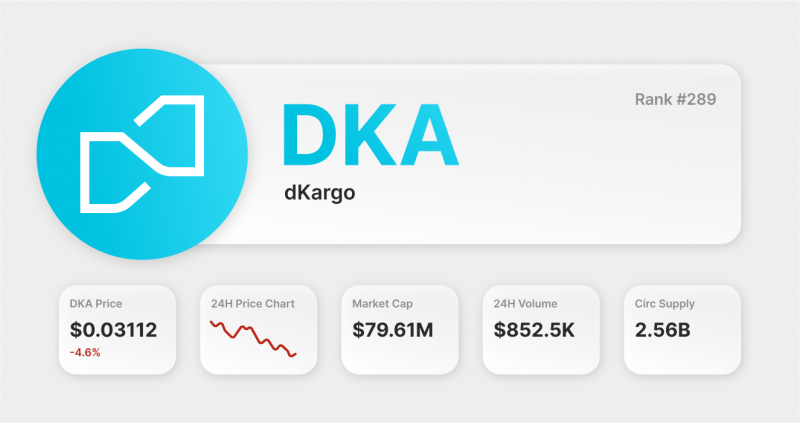
dKargo (DKA) is a groundbreaking, decentralized crypto initiative that concentrates on transforming the logistics and supply chain sector via blockchain technology. This AI crypto project was initiated in 2019; dKargo aims to tackle the obstacles and inefficiencies present in the conventional logistics industry, such as limited transparency, elevated costs, and restricted collaboration among stakeholders, by developing a secure, transparent, and efficient platform for monitoring and managing shipments and transactions.
A distinguishing characteristic of the dKargo project is its inventive method for data feeds management and sharing within the logistics sector. By harnessing blockchain technology, dKargo creates a tamper-resistant, transparent, and easily accessible ledger of shipping information, allowing all stakeholders to track the movement of products in real time and confirm data accuracy. This enhanced transparency assists in building trust among participants, streamlining operations, and decreasing the likelihood of disputes and fraud within the industry.
Use Case
The potential applications for the dKargo project extend across various logistics and supply chain segments. For instance, e-commerce companies can use the platform to improve their delivery tracking and management capabilities, boosting customer satisfaction and lowering operational costs. Freight forwarders and carriers can take advantage of dKargo’s transparency and data-sharing features to optimize their routes and schedules, resulting in more efficient transportation and a reduced environmental footprint. Additionally, the platform can facilitate more effective collaboration between different logistics stakeholders, such as manufacturers, distributors, and retailers, promoting greater innovation and efficiency in the AI sector as a whole.
The Native Token
The native digital asset of the dKargo project is DKA, which is utilized as a currency for logistics services, enabling smooth and cost-effective transactions among shippers, carriers, and recipients. The utility token is also used for staking and governance purposes. DKA tokens can also be earned as rewards by users who provide valuable data or services to the platform, encouraging active involvement in the dKargo ecosystem.
9. Alethea AI (ALI)
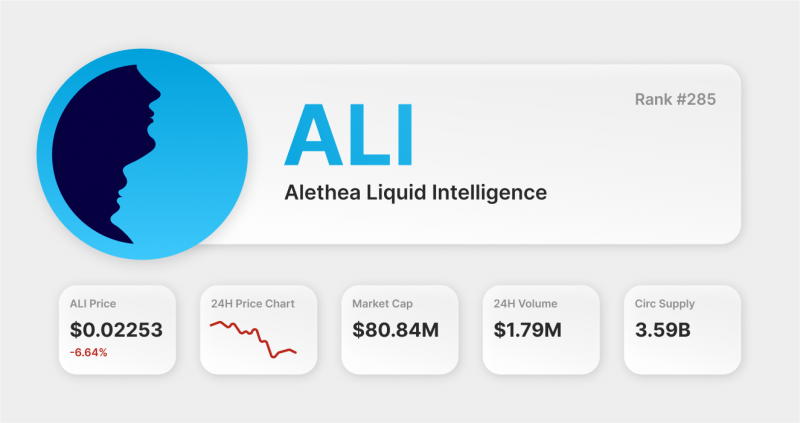
Alethea AI (ALI) represents a cutting-edge and inventive crypto initiative to establish a decentralized environment for creating and monetizing AI models. The project, launched in 2021, emphasizes synthetic media and smart virtual avatars. Alethea AI aims to make AI technology more accessible, empowering creators, developers, and users by offering a transparent, secure, and efficient platform for constructing, sharing, and interacting with AI-driven digital assets.
A key characteristic of the Alethea AI project is its concentration on synthetic media and intelligent virtual avatars. The platform enables users to create, modify, and engage with AI-powered digital characters for various purposes, such as content creation, education, entertainment, and marketing. By utilizing advanced AI techniques, including natural language processing (NLP) and generative adversarial networks (GANs), Alethea AI facilitates the development of highly realistic and interactive virtual avatars that can react to user inputs, learn from their interactions, and evolve over time.
Use Case
The Alethea AI project has numerous potential applications across a variety of industries and sectors. Within the entertainment industry, Alethea AI can be employed to generate interactive and personalized content, such as AI-driven video games, virtual reality experiences, and digital storytelling. In the realm of education, intelligent virtual avatars can serve as tutors or assistants, offering personalized guidance and support to students. Furthermore, businesses can use the platform to create AI-powered marketing campaigns, customer support services, and virtual sales agents, ultimately enhancing customer engagement and promoting innovation in the digital economy.
Discover the Tools That Power 500+ Brokerages
Explore our complete ecosystem — from liquidity to CRM to trading infrastructure.
The Native Token
The project’s native digital currency, ALI, serves as a payment method for accessing AI models, services, and tools on the platform and for buying AI-generated content and crypto tokens. Creators and developers can earn ALI tokens as rewards for contributing valuable AI models, services, or content to the platform, which encourages active participation in the Alethea AI ecosystem. The token is also used for staking and governance purposes, enabling network members to contribute to the platform’s security and participate in decisions about its ongoing evolution.
10. Cortex (CTXC)
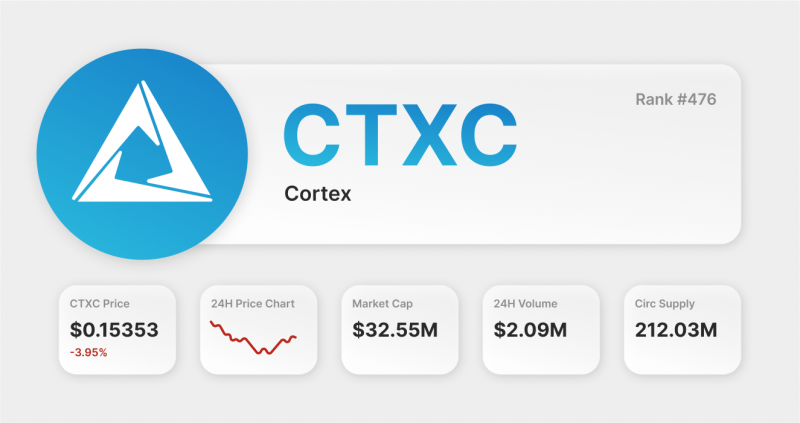
Cortex (CTXC) represents a decentralized crypto initiative to establish a sophisticated artificial intelligence (AI) platform on the blockchain. Initiated in 2018, the Cortex project seeks to create an open-source, transparent environment where developers and users can generate, exchange, and implement AI models and AI algorithms. The project’s main objective is to use blockchain technology to make AI more accessible and encourage collaboration among AI researchers, developers, and users globally.
A distinctive aspect of the Cortex project is its pioneering approach to incorporating AI with blockchain technology. By offering a decentralized and transparent platform for AI development, Cortex ensures that AI models and AI algorithms can be openly accessed and verified, promoting trust and collaboration among participants. The platform also takes advantage of advanced AI techniques, such as machine learning and natural language processing, enabling the creation of intelligent smart contracts that can adapt and react to real-world data inputs.
Use Case
The potential applications for the Cortex project span across numerous industries and sectors. For example, the platform can be used by AI researchers and developers to collaborate on groundbreaking AI projects, expediting advancements in fields like healthcare, finance, and environmental sustainability. Businesses can use Cortex’s intelligent smart contracts to develop more efficient and adaptable supply chain solutions or enhance their customer support services with AI bots. Moreover, the project can support the creation of decentralized applications (dApps) that include AI functionality, such as prediction markets, social media platforms, and gaming experiences.
The Native Token
The Cortex project’s native digital currency, CTXC, is employed for transactions on the platform, allowing users to acquire AI models and services. The token also incentivizes developers and AI researchers by enabling them to earn CTXC tokens for contributing valuable AI models and AI algorithms to the platform and is used for staking and governance.
Future of AI in Cryptocurrencies
The emergence of AI and blockchain technology has opened the door to unprecedented innovation in the crypto space. By utilizing AI-driven automation and analytics, businesses can create more efficient methods for managing financial assets, trading on financial markets, and developing blockchain-based applications. Moreover, AI-powered technologies are set to revolutionize the security field by introducing sophisticated algorithms that can detect suspicious activity on blockchains and reduce transaction time.
In addition to its potential uses in finance and security, AI can also be employed to facilitate better decision-making within the crypto industry. For example, AI-driven predictive analysis can be used to forecast market trends and identify potential investment opportunities in the crypto space. Furthermore, AI can drive more effective marketing campaigns by analyzing customer data and providing personalized content recommendations.
The future of AI in cryptocurrencies is expected to foster greater trust and collaboration between participants within the industry. By utilizing intelligent protocols powered by AI algorithms, blockchain networks can become more secure and reliable for users, enabling them to transact confidently. Additionally, data generated within the crypto sector can be analyzed using AI techniques to identify meaningful insights allowing businesses to make smarter decisions when developing new applications or trading strategies. These advancements could pave the way for a more efficient and user-friendly cryptocurrency ecosystem where transactions are fast and secure.
Furthermore, developing AI infrastructure and an AI marketplace for services will facilitate greater access to innovative solutions within the crypto world. By enabling users to access powerful AI tools without purchasing and managing costly hardware, businesses can gain an advantage by deploying smarter algorithms faster. As these technologies evolve, we should expect to see an even stronger presence of AI in cryptocurrencies that will revolutionize the industry as we know it today.
Bottom Line
The potential applications of AI in the crypto space are vast and varied. From creating safer and more secure networks to providing predictive analytics services, AI has the power to revolutionize the industry by introducing new protocols and features. By making blockchain networks more accessible and efficient for all users, AI is set to change the way we view cryptocurrency technology and its capabilities. With its powerful automation tools and intelligent analytics, AI will be a key player in enabling greater trust and collaboration within the cryptocurrency industry as it continues to grow and evolve.
Disclaimer: The information provided in this article is for informational purposes only and should not be considered as financial advice. Investing in cryptocurrencies and other digital assets carries risks, and everyone must conduct their own research and consult with a professional financial advisor before making any investment decisions. The author and the platform are not responsible for any losses or damages that may arise from using the information provided herein









